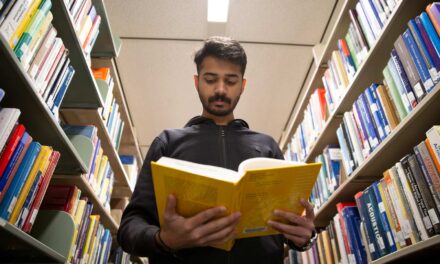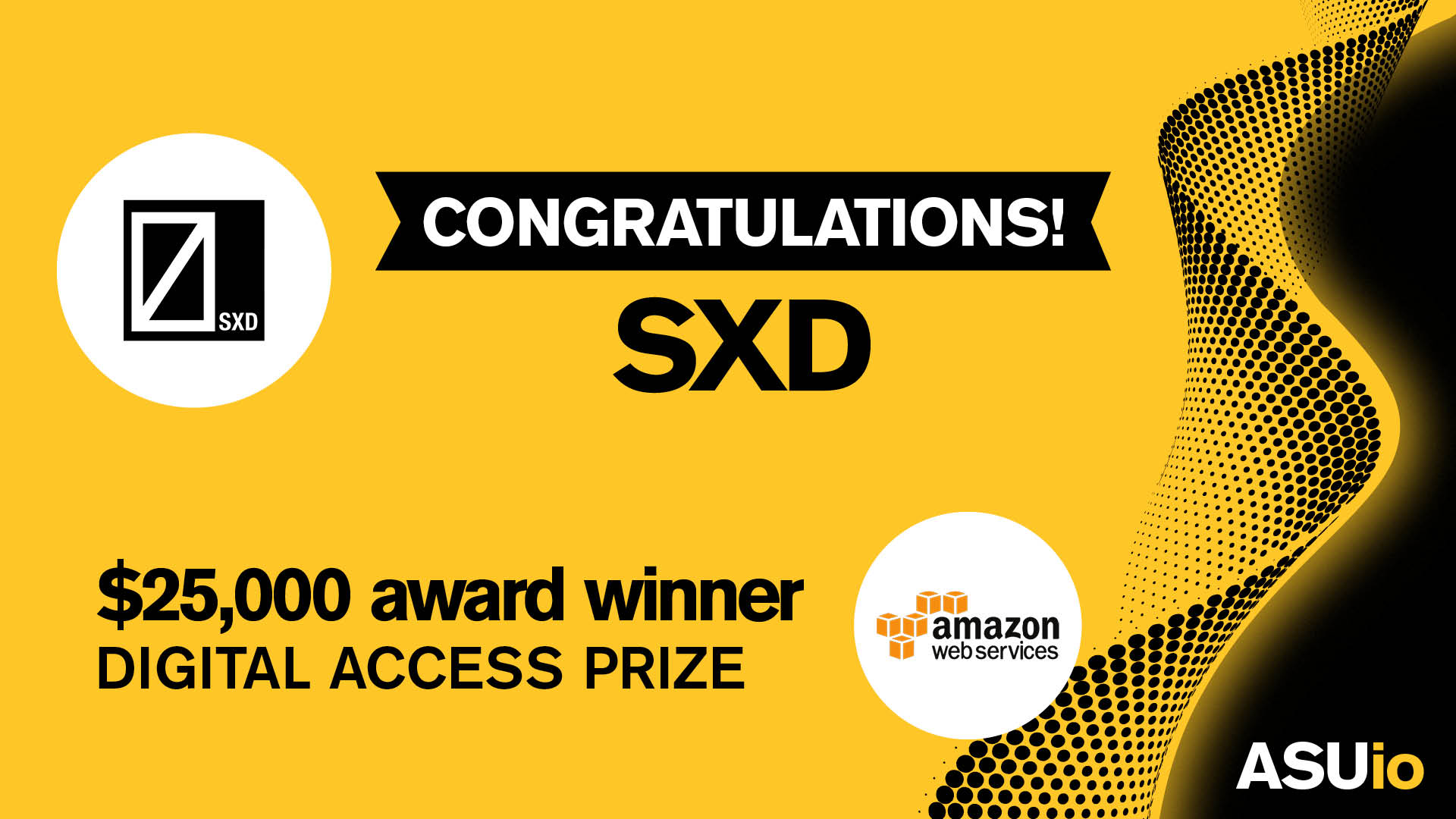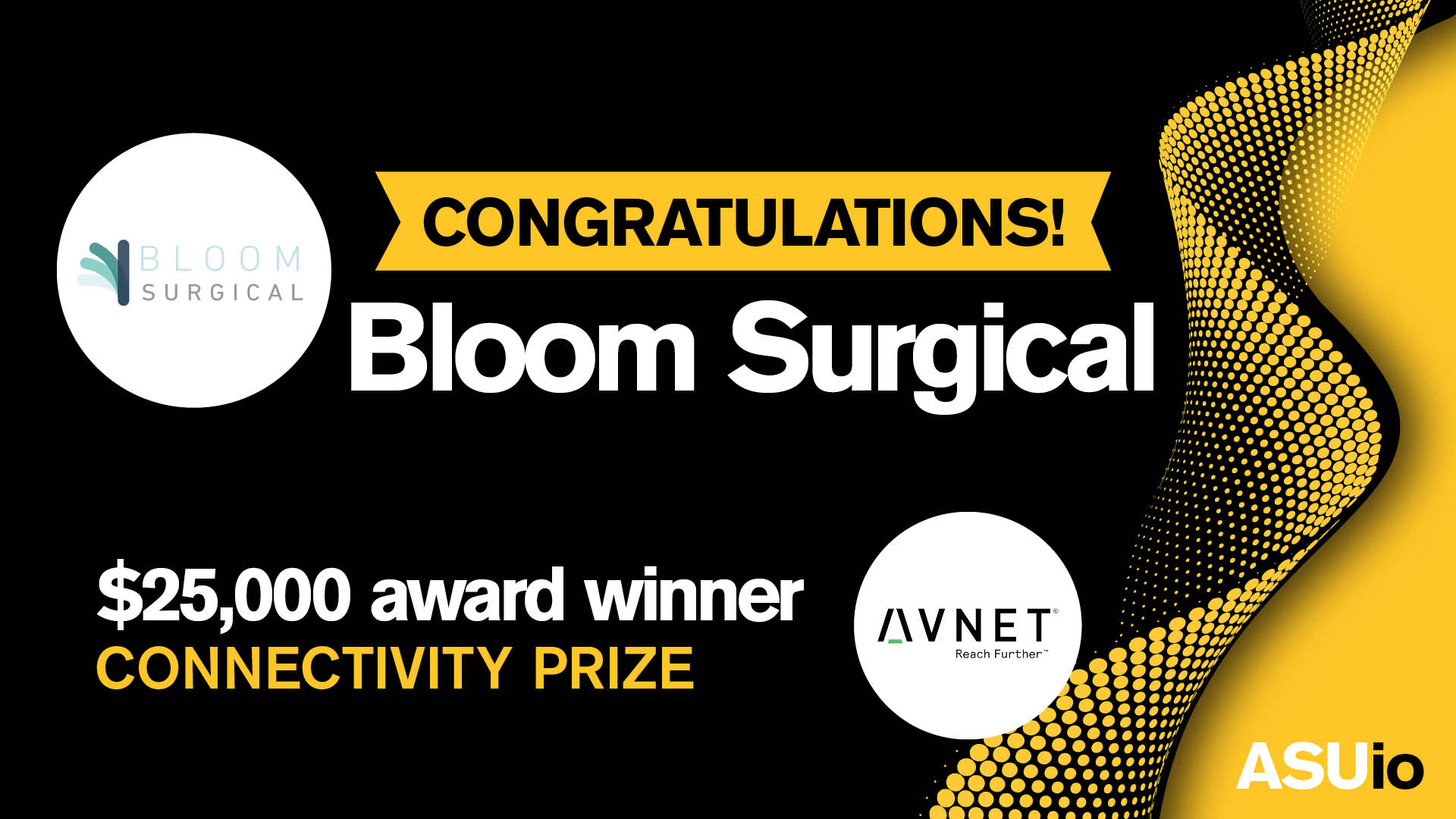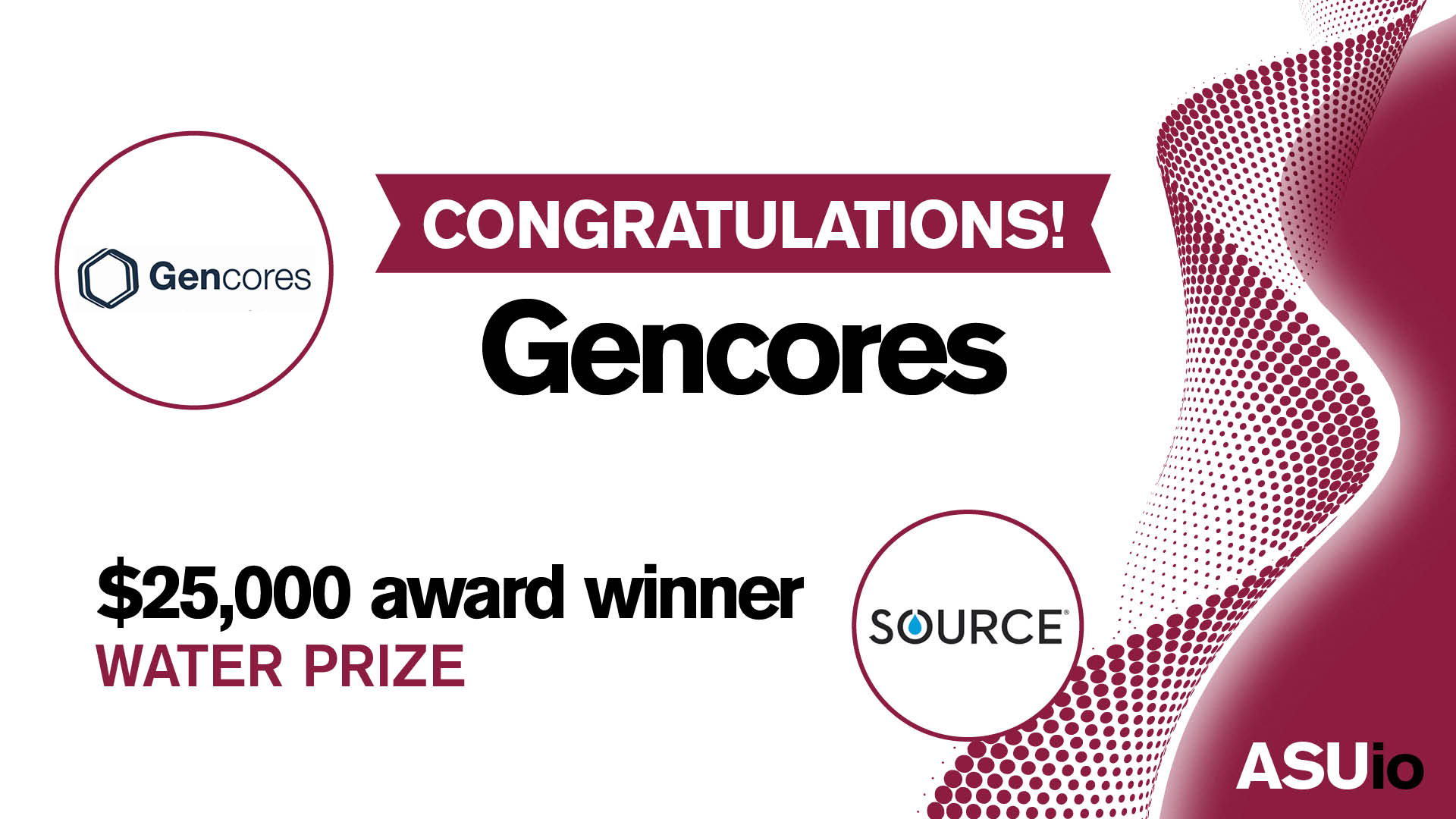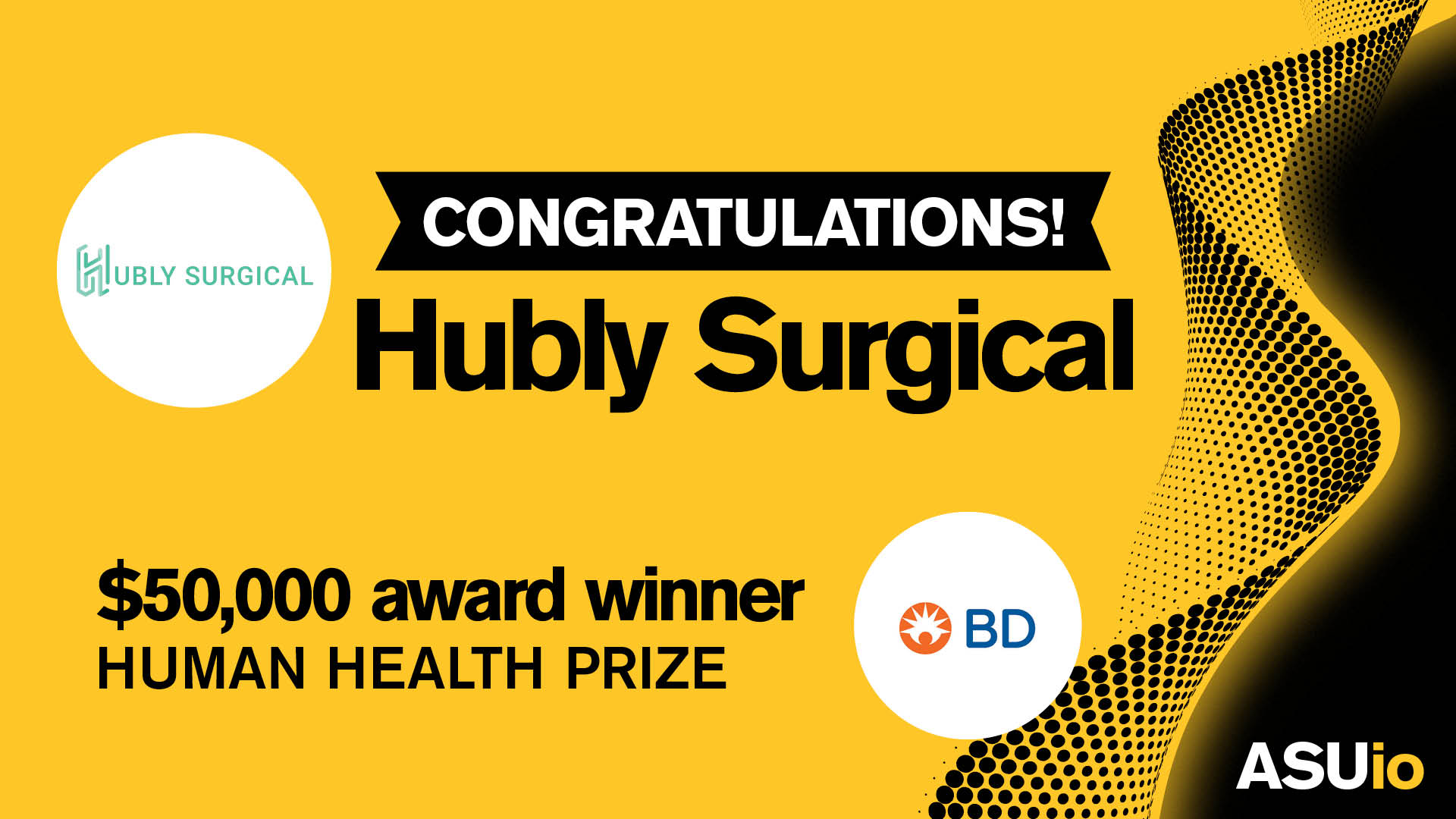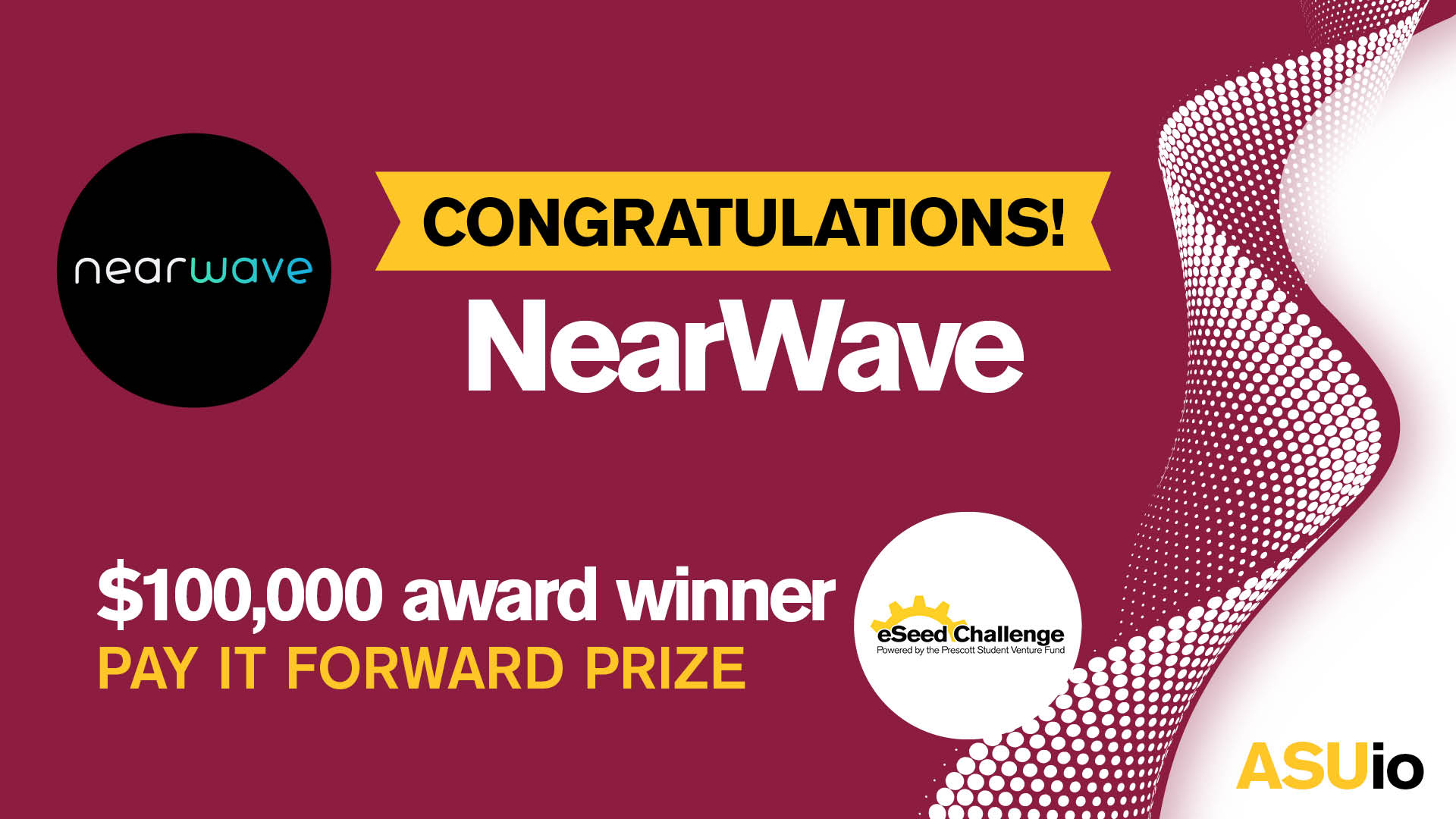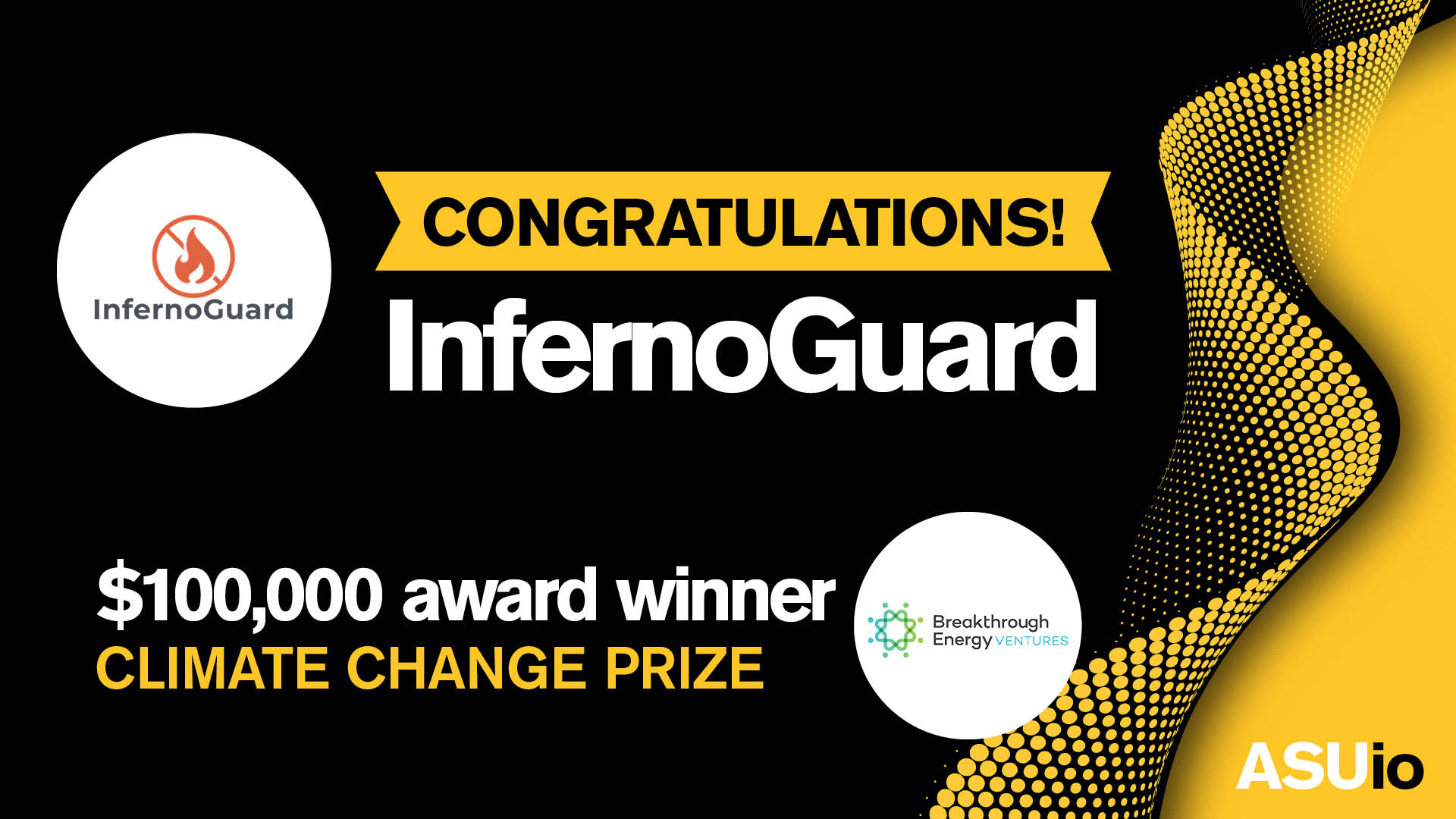
Pitching for greatness
Environmental and human health solutions take the stage at the 2022 ASU Innovation Open
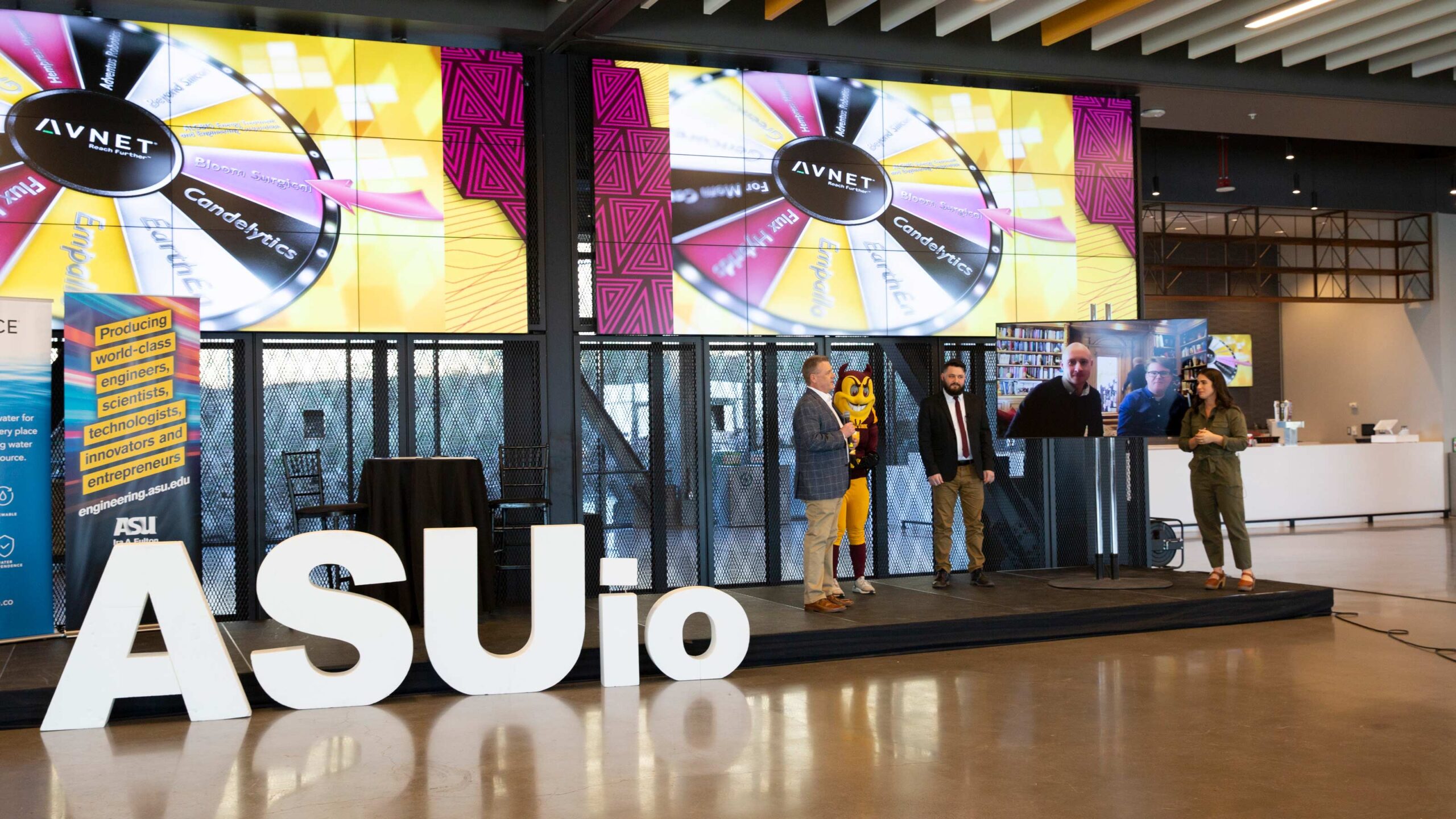
Forward thinking and creative solutions carried the day at the Arizona State University Innovation Open award show last Friday. Technology innovation and entrepreneurship were on full display at the event, known as ASUio, as 30 teams of students representing 20 universities gathered for the live, virtual event.
In only its sixth year, ASU Innovation Open is gaining traction among young innovators as an excellent way to earn investment and mentorship — as well as to see how their ventures measure up against other startups being pitched by some of the most talented, enterprising student entrepreneurs in the world.
Hosted by ASU and the Ira A. Fulton Schools of Engineering, ASU Innovation Open invites collegiate teams to pitch their ventures to business leaders and technology developers from across the Phoenix metropolitan area who support the growing entrepreneurial ecosystem in Arizona and beyond.
In total, two teams left the 2022 event with $100,000 grand prizes powered by Breakthrough Energy Ventures and the ASU eSeed Challenge, while four others earned $225,000 in non-diluted cash to support their ventures from sponsors supporting the Fulton Schools mission of idea generation and social capitalism. These six teams represent the top ventures among the more than 100 collegiate teams that submitted pitches for a chance to win at ASUio 2022.
Kyle Squires, ASU’s vice provost of engineering, computing and technology and the dean of the Fulton Schools, views entrepreneurship as a vitally important complement to students’ growth and learning experiences as they train to become the engineering and technology leaders of the future.
“We have the easy part,” Squires says about encouraging and rewarding students who embrace the entrepreneurial mindset. “We provide the support, the structures, the people, the mentors — whatever it takes to get a venture moving. When we started ASU Innovation Open, we wanted to become the premier student entrepreneurial competition in the Southwest. We’ve achieved that. And so, as engineering becomes increasingly global, so too should entrepreneurial opportunities for students — and it’s why we’re proud this competition is attracting students from all over the world to compete to get to that next level.”
Primed for impact
ASU Innovation Open awards startups with the potential to use engineering and technology to uniquely and positively make an impact in the world. InfernoGuard, winner of the $100,000 Climate Change Prize, sponsored by Breakthrough Energy Ventures, is already making a difference in communities where its modeling, software and hardware solutions are being tested to monitor environmental conditions and immediately notify landowners of wildfire threats.
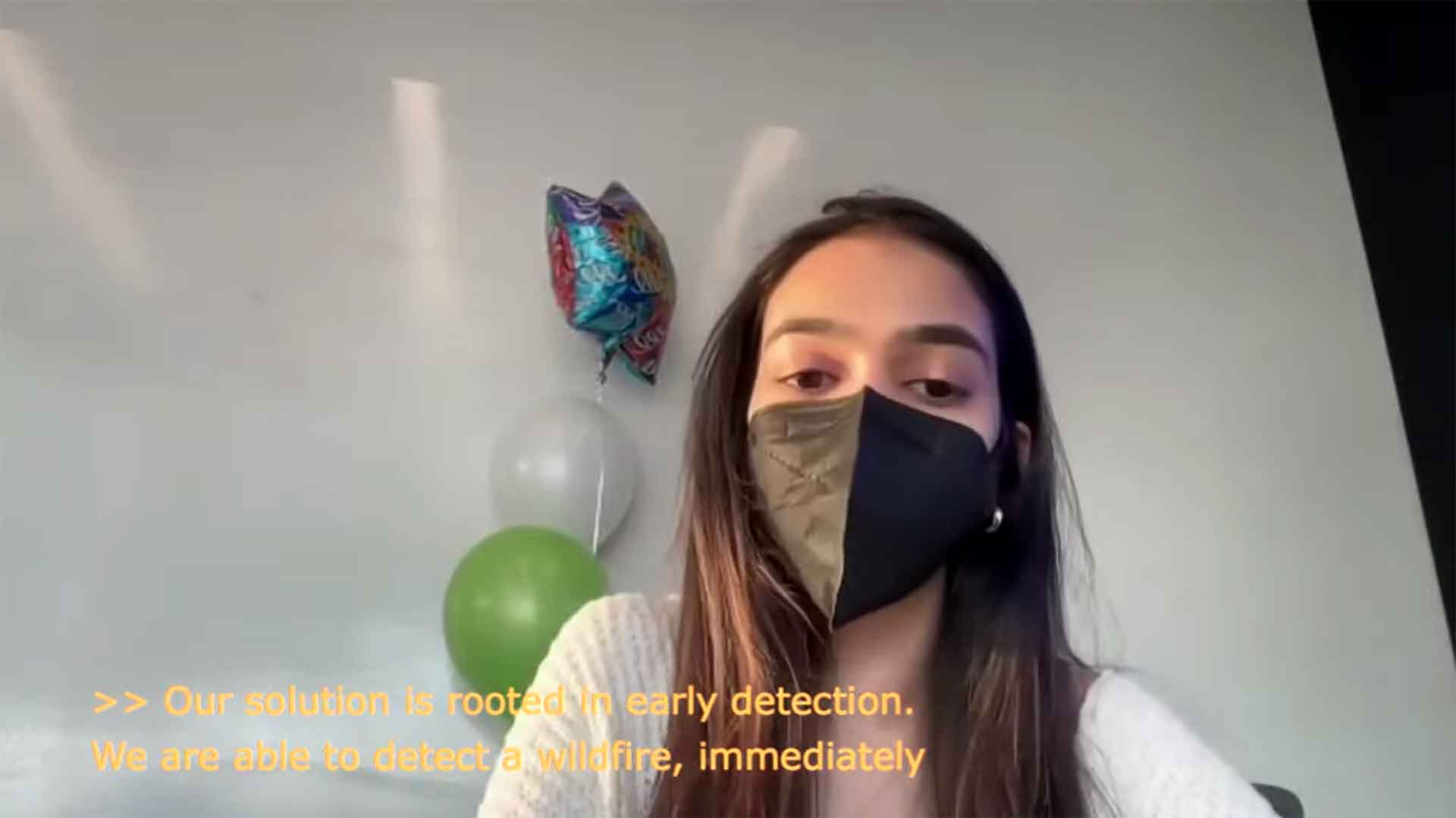
InfernoGuard Chief Operating Officer Nandita Balaji accepts the $100,000 Climate Change Prize, sponsored by Breakthrough Energy Ventures.
According to Nandita Balaji, InfernoGuard’s chief operating officer, the idea for the company was born when she and her high school classmates saw the detrimental impact of smoke in their hometown from wildfires that were burning nearly 100 miles away.
Now a second-year neuroscience and computer science student at Johns Hopkins University, Balaji and her team have developed a device that accurately pinpoints fires and alerts users so they can respond quickly and prevent fires from spreading. Their solution has already gained support from farmers who see the team’s subscription-based detection service as far more cost effective than the potentially millions of dollars lost in damages caused by wildfires.
“The way that we think about climate change has become more pronounced,” says Peter Turner of Breakthrough Energy Ventures, a $2 billion climate tech venture capital firm founded by Bill Gates that invests in companies and technologies that radically reduce global carbon emissions. “We as a society are going to become uniquely more proactive about management of natural hazards like wildfires, and that’s just what InfernoGuard is doing. So we’re excited to support them on this mission.”
Students representing NearWave, a venture from the University of Notre Dame, could barely contain their excitement. The entire lab erupted into cheers when they learned they’d earned the $100,000 Pay it Forward Prize from the ASU eSeed Challenge. The eSeed Challenge is powered by the Prescott Student Venture Fund — a fund supported by Fulton Schools alumnus Tom Prescott, an avid supporter of ASU’s entrepreneurial programs and a speaker at the award show.
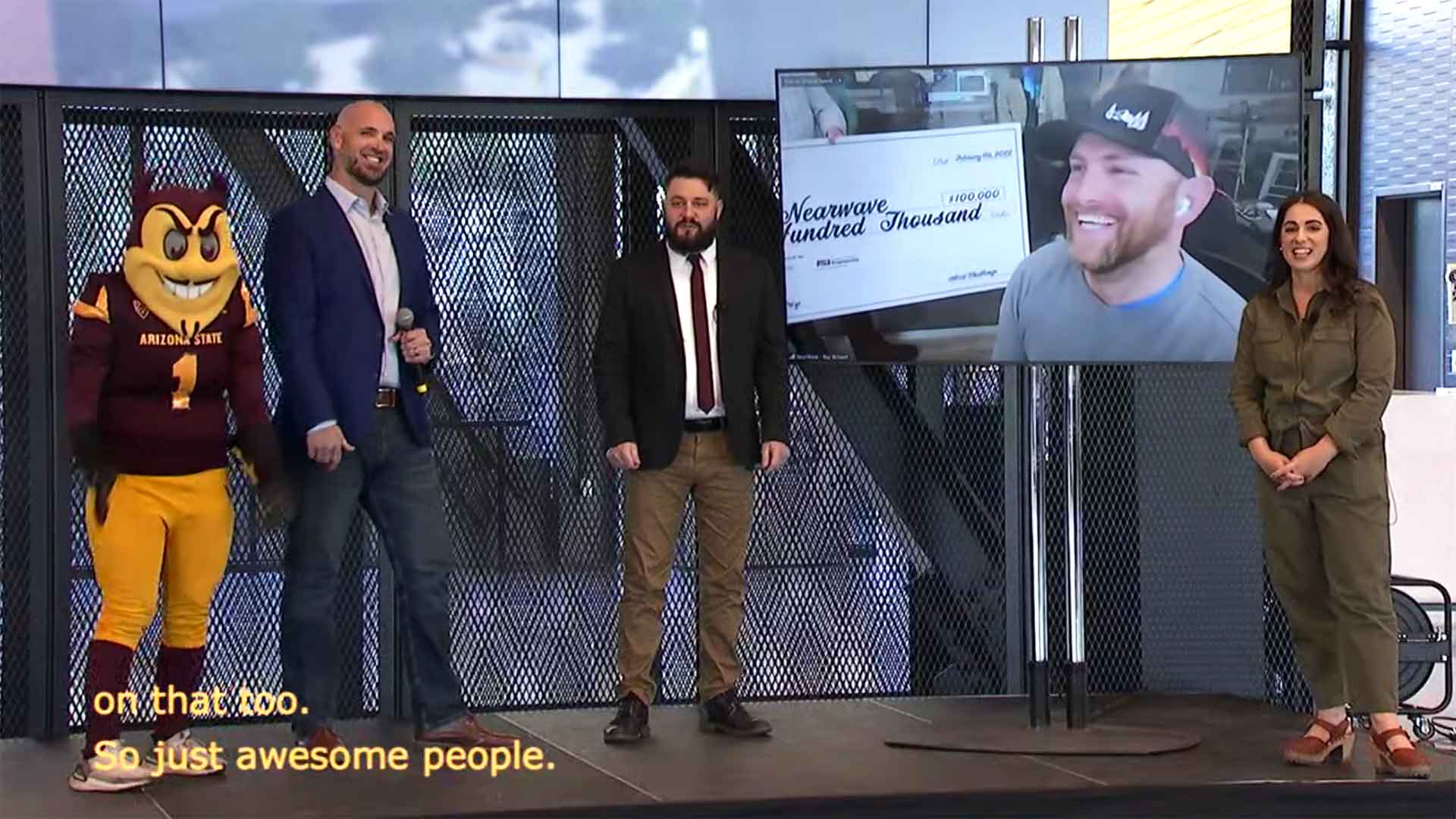
Brent Sebold, interim director for ASU’s Master of Science in Innovation and Venture Development program, announces CEO Roy Stillwell and NearWave as the $100,000 grand prize winner of the Pay It Forward Prize on behalf of Tom Prescott and the ASU eSeed Challenge. Photographer: Erika Gronek/ASU
NearWave has developed a handheld, point-of-care imaging device that uses near infrared spectroscopy to monitor and diagnose breast cancer. Able to “see” through even dense breast tissue, the non-invasive technology device is helping clinicians make decisions about pre-surgery breast cancer treatment, often saving patients from enduring months of toxic side effects and/or ineffective treatment.
“Our approach is currently the smallest and the fastest by about 100 times of any device like this, research or commercial, in the world,” says Roy Stillwell, NearWave’s founder and CEO. “Generally, we can change chemotherapy regimes in a much quicker time period. We’ve done some work to show that within a week, we can tell whether or not someone’s responding to therapy rather than waiting until that three-month or six-month time frame. It makes a huge difference in the amount of chemotherapy these women have to undergo.”
Brent Sebold, the interim director for ASU’s Master of Science in Innovation and Venture Development program and the Fulton Schools director liaison to J. Orin Edson Entrepreneurship + Innovation Institute, presented the award and noted how impressed the judges were with the team throughout the competition and how transformative the technology can be for the medical community.
This year’s $50,000 Human Health Prize was sponsored by BD, or Becton, Dickinson and Company, a leading global medical technology company. They awarded Co-founder and CEO Casey Grage of Johns Hopkins University for the neurotech startup Hubly Surgical.
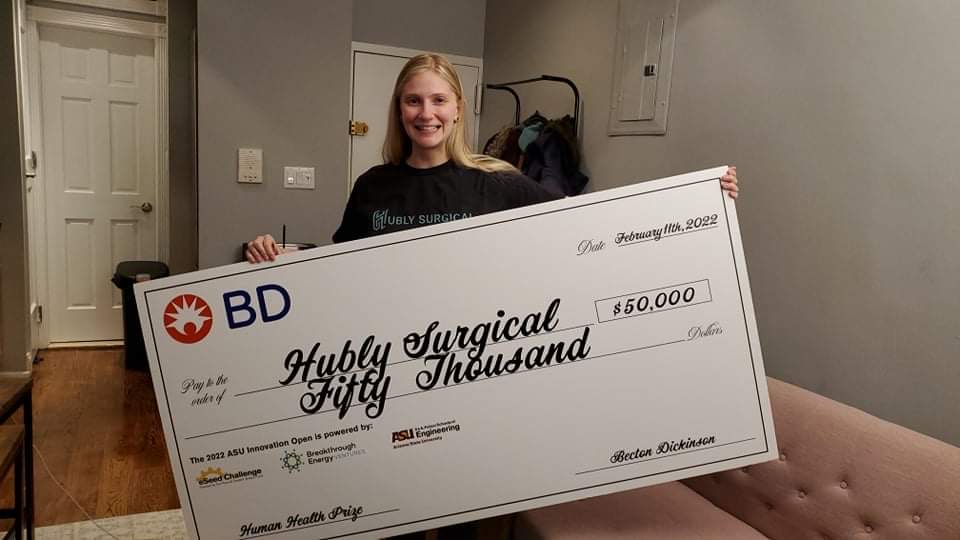
Johns Hopkins University student Casey Grage accepts the $50,000 Human Health Prize sponsored by BD for her medical device company, Hubly Surgical. Photo courtesy of Casey Grage.
Grage and her team have developed the Hubly Drilling System, an advanced intracranial and orthopedic integrated electric drilling system with auto-stop and catheter guidance. It is designed to replace today’s standard for emergency neurosurgery. Using Hubly’s drill system that includes an auto-stop feature, and replacing industry-standard manual drills, would eliminate the potential for accidental drilling into the brain, which in total, costs the U.S. health care system approximately $4 billion each year.
“Hundreds of thousands of people have this [manual] drill go into their heads every single year with an incredibly high complication rate,” Grage says. “The very least we can do for these patients is give them the safest tools possible.”
Alex Lastovich, BD’s research and development director of innovation, noted that Hubly Surgical’s solution identified an unmet need in the health care space and lauded the team for having a clear plan for getting their solution into the hospital environment as reasons they selected the team for this award. Lastovich says Hubly Surgical has developed a device that can incredibly improve patients’ quality of life.
The other 2022 ASUio winners were:
- Gencores, representing Harvard University and Massachusetts Institute of Technology, won the $25,000 Water Prize sponsored by SOURCE Global. The prize was presented to Co-founder and CEO Jules Thiery, whose company aims to transform transportation by unlocking high-volume manufacturing of high-performance composites. Gencores is seeking to transform transportation electrification by producing unique ultra-light foam composites for original equipment manufacturers.
- Bloom Surgical won the Connectivity Prize sponsored by Avnet, earning $25,000 in cash. Jacob Sheffield of Brigham Young University accepted the prize on behalf of Bloom Surgical, which has created a minimalistic origami-inspired solution for clean laparoscopic lenses that can be used during minimally invasive surgeries, eliminating the need to clean the camera multiple times during surgery due to visual disruptions.
- Shelly Xu, founder of SXD, or Shelly Xu Designs, won the $25,000 Digital Access Prize from Amazon Web Services. Xu is building a software application that seamlessly turns any design sketch and leftover or wasted fabrics into zero-waste clothing that looks beautiful and costs approximately 55% less to produce. Representing Harvard Business School, Xu, a designer, is combining design and tech to scale sustainable, aesthetic and efficient clothing.
Conversations between founders
The 2022 award show was not only about finding out who’d walk away with additional capital to fund their startups. Attendees also got tips and insights from business leaders, founders and former ASUio champions whose success has continued far beyond the competition.
Cody Friesen, the ASU Innovation Open founder, Fulton Entrepreneurial Professor and an associate professor of materials science and engineering in the Fulton Schools, welcomed the competitors and congratulated them on making it to the competition as finalists.
“Every year the contestants get better; every year the competition gets bigger,” Friesen said during the event. “We’re so excited about the range of students, the internationality of the competition this year, and just all the cool technology that students are bringing into companies and trying to bring out to the world.”
Friesen, who spun out his own company SOURCE Global (formerly Zero Mass Water), understands the challenges and opportunities the competitors may be facing as they establish their own ventures. Friesen and Neil Grimmer, founder and former CEO of Plum Organics who eventually sold the company for $250 million, shared stories about their individual entrepreneurial journeys and the importance of being open to applying different forms of technology as your company evolves. It’s one of the reasons Friesen was able to successfully transform his knowledge of the renewable energy space into a new hydropanel technology — a tangible product that people around the globe can use to get access to clean drinking water.
The two also noted the importance of collaborating with others with the right expertise and spoke of the opportunity they’ve had to work together as colleagues at SOURCE.
Two other founders who could directly relate to being in the competitors’ shoes were former ASU Innovation Open $100,000 grand prize winners Sophia Wennstedt and Katherine Sizov. Wennstedt is the the CEO and co-founder of blip energy, a company focused on democratizing energy storage and accelerating the adoption of renewable resources. Sizov leads Strella Biotechnology, which has developed biosensors that monitor ethylene production in fruit to help move produce to customers and help combat food waste.
Both companies have continued to gain momentum since their ASUio wins, despite setbacks and slow periods resulting from a global pandemic. Since winning ASUio last year, blip energy is expanding into new customer bases for its IoT energy resources and exploring new ways to launch their product. Meanwhile, Strella Biotechnology’s biosensors are being used by produce supply companies and grocery store chains throughout the country. The company continues to secure significant financing as it grows and expands.
The founders reflected on their own journeys and offered words of encouragement to all the student entrepreneurs watching the competition.
“It’s a really big accomplishment to even be competing and to be passionate about something — having thought through something so deeply and truly caring about it,” Sizov shared with attendees.
“It’s such an accomplishment to have gotten this far in terms of being in a competition like this,” Wennstedt added. “We made a ton of connections at competitions, but especially at ASUio last year. They were super helpful in us moving forward and making all the progress that we made in the year after that. So, congrats on being here. Keep on keeping on.”
Watch the full 2022 ASU Innovation Open broadcast, available now on YouTube.
2022 ASU Innovation Open Sponsors
Powered By Sponsors
Breakthrough Energy Ventures
eSeed Challenge (Prescott Student Venture Fund)
ASU Engineering
Innovation Sponsors
BD (Becton, Dickinson and Company)
Amazon Web Services
Avnet
Source
Media Sponsors
Arizona Board of Regents
In Kind Sponsors
Altium
August United
BS Solidworks
GoEngineer
Institute for Digital Progress
Thumbraise
















